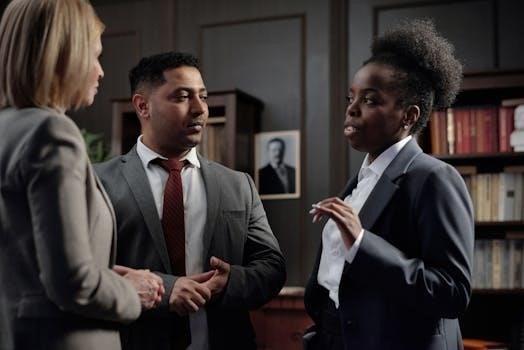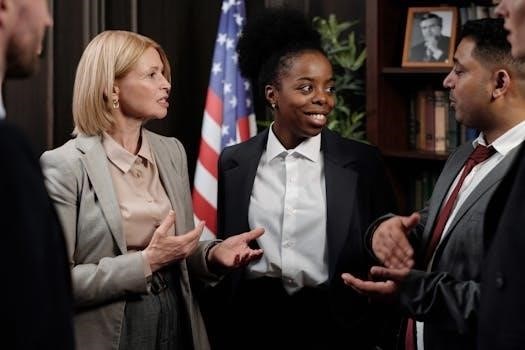In the high-stakes world of politics, missteps can have severe consequences․ This section will delve into the common errors that politicians make, from time management issues to public gaffes․
The Importance of Avoiding Common Mistakes
Avoiding common political mistakes is crucial for maintaining credibility and public trust․ These missteps, ranging from unintentional gaffes to strategic blunders, can significantly impact a politician’s career․ Understanding and learning from these errors can prevent future damage․ It is important to recognize that mistakes can come from many sources․ It’s also important to remember that both rookie mistakes and deeper ideological errors are harmful․ Therefore, this knowledge can lead to better decisions, and more effective leadership, ensuring politicians remain accountable․

Time Management Pitfalls
Politicians often face hectic schedules, making time management crucial․ Poor decisions often result from this pressure, highlighting the need for effective planning and prioritization to avoid errors․
Hectic Schedules and Poor Decision Making
The pressure of constant demands and a packed itinerary can lead to hasty and ill-considered choices․ Politicians must learn to balance their commitments with the need for calm deliberation․ This often means implementing strategies to manage their time and delegate tasks effectively․ Overwhelmed by a never-ending stream of engagements, they can easily make mistakes under stress․ Learning to make sound judgements under pressure is key to success and avoiding poor time management․
Political Gaffes and Their Impact
Unintentional mistakes, or political gaffes, can significantly damage a politician’s career and public image․ These errors highlight the critical nature of every word spoken in the public eye․
Unintentional Mistakes in the Public Eye
Politicians often find themselves under intense scrutiny, where even the smallest slip-up can become a major issue․ These unintentional errors, frequently referred to as gaffes, can quickly escalate and impact public perception․ Such mistakes aren’t exclusive to seasoned politicians; they can happen to anyone, highlighting the importance of awareness and careful communication․ The impact can be significant, affecting their career trajectory and how they’re perceived․
The Significance of Every Word
In the realm of politics, every word uttered carries weight and can be subject to intense analysis․ Given the constant media attention and public scrutiny, politicians must be exceptionally mindful of their language․ What might seem like a minor slip of the tongue can quickly become a major headline․ The impact of seemingly innocuous statements can shape public opinion, emphasizing the need for precise and thoughtful communication․ Therefore, politicians must carefully consider each word, knowing that it could significantly impact their career․
Common Campaign Mistakes for New Candidates
New candidates often stumble due to inexperience․ This section explores the most common pitfalls, offering a guide to help them navigate the complexities of a political campaign․
Essential Mistakes to Sidestep
First-time candidates often make errors due to lack of experience․ It is crucial to avoid common missteps such as not having a qualified campaign manager early on․ Another essential mistake is failing to test campaign issues or messages which can lead to misinterpreting public opinion․ Furthermore, overlooking the importance of connecting with constituents can severely hinder a campaign․ Understanding these mistakes is key to running a successful political race․
Pre-Campaign Launch Errors
Many crucial mistakes happen even before a campaign officially launches․ Candidates might fail to conduct adequate diligence or have a flawed initial strategy․ One common pre-launch error involves not securing a qualified campaign manager early enough, especially one who can coordinate fundraising․ Furthermore, neglecting to test campaign issues and messages can lead to a weak platform․ Ignoring these early steps can lead to significant problems later on․

Mistakes in Campaign Strategy
Campaign strategies often falter due to poor media spending and resource allocation․ Ineffective fundraising coordination is another common pitfall that can derail even the most promising campaigns․
Media Spending and Resource Allocation
Spreading media dollars too thin is a common mistake, where campaigns utilize multiple platforms ineffectively instead of focusing on a few with strong impact․ This approach can include sending out one direct mail piece, taking out a few newspaper ads, and running a radio ad, which can lead to diluted messaging․ Effective resource allocation requires careful planning and targeted spending to maximize reach and impact․
Fundraising Coordination
Having a qualified campaign manager early on is key to coordinating fundraising effectively․ This is crucial for successfully running for office and avoiding common mistakes․ Without proper coordination, fundraising efforts can be disorganized and inefficient, hindering a campaign’s ability to secure the necessary financial resources․ A well-coordinated fundraising strategy is essential for any political campaign’s success․
Polling Errors and Message Testing
Testing campaign issues or messages is critical to avoid polling mistakes․ It’s important to understand how the public perceives a campaign’s messages and adapt accordingly․
The Importance of Testing Campaign Issues
Campaigns often make the mistake of not testing their issues with the public․ It’s crucial to gauge how a message will resonate with voters to avoid negative reactions․ This involves understanding voter perceptions and refining campaign strategies․ Failing to test campaign issues can lead to misaligned messaging and wasted resources․ Proper testing can help identify which issues resonate most with voters and allows for a more effective and successful campaign․

The Psychology Behind Political Mistakes
Elected officials often repeat errors due to systematic reasons linked to adapting to their political environment․ Pressure is a significant factor that contributes to recurring mistakes․
Systematic Reasons for Recurring Errors
Political scientists have observed that elected officials often make similar mistakes because they share characteristics developed by adapting to their environment․ One strong force is the constant pressure they face․ This pressure, coupled with self-serving interpretations of others’ actions, leads to predictable and recurring errors․ These patterns are not random but are deeply rooted in the dynamics of political life․ Understanding these systematic influences is key to avoiding pitfalls․
Adapting to the Political Environment
Politicians adapt to their environment, often developing traits that contribute to recurring mistakes․ The pressure to maintain support and avoid blame can lead to a culture of never apologizing or admitting errors․ This adaptation, while sometimes strategic, can reinforce harmful patterns․ It is crucial for political figures to be aware of these environmental pressures and actively work to counteract the negative effects they produce․ Understanding this adaptation is key․

The Aftermath of Mistakes
The way politicians handle errors is critical․ Admitting mistakes can affect public perception, while a culture of never apologizing can further damage trust and reputation․
Admitting Mistakes and Public Perception
When politicians make mistakes, how they respond significantly shapes public opinion․ Acknowledging errors with sincerity can foster trust and demonstrate accountability․ Conversely, refusing to admit fault often leads to public backlash and erodes confidence․ The ability to own up to missteps and show a willingness to learn from them can be a sign of strength and integrity, enhancing a politician’s image rather than diminishing it․ The public often values honesty and transparency․
The Culture of Never Apologizing
A troubling trend in politics is the culture of never apologizing, where admitting mistakes is viewed as a sign of weakness․ This approach often stems from a fear of losing support or giving opponents ammunition․ However, this mindset can be detrimental, fostering a lack of accountability and eroding public trust․ The refusal to apologize can create a perception of arrogance and a disconnect from the concerns of the electorate․ This approach can damage a leader’s long-term credibility․
Types of Political Errors
Political errors range from minor missteps to fatal mistakes with irreversible consequences․ These errors can stem from misjudgment, intuition, or coincidence, impacting a politician’s career and the nation․
Fatal Mistakes and Their Consequences
The most damaging political errors are those that are irreversible and detrimental to the nation․ These fatal mistakes, often born from misjudgment or coincidence, can have lasting impacts․ Politicians may not always recognize when they commit such errors, and the effects can be profound․ These errors can alter the course of history, casting a shadow over the future․ It is imperative to understand the gravity of these actions․
Rookie Mistakes vs․ Deeper Ideologies
It’s crucial to differentiate between simple rookie mistakes and errors stemming from harmful ideologies․ Rookie mistakes are easier to correct, unlike deeply ingrained beliefs that can be more damaging․
Distinguishing Harmful Errors
Understanding the difference between simple missteps and those rooted in problematic ideologies is essential․ While rookie mistakes are often due to inexperience and can be corrected, errors stemming from deeply held harmful beliefs can have far-reaching and negative consequences․ It’s vital to address the root cause of the mistake and not just its surface manifestation․ Recognizing the difference is a key step in avoiding future errors and ensuring ethical leadership․
Practical Advice for Avoiding Missteps
Connecting with constituents authentically is crucial․ Avoid oversharing or misstepping, as this can undermine trust․ Engage meaningfully, listen to concerns, and be genuine in your interactions․
Connecting Effectively with Constituents
To truly connect with constituents, it’s vital to avoid the common pitfall of seeming detached or out of touch․ Engage with them directly, listening intently to their concerns and experiences․ Don’t rely solely on formal communication; make an effort to be present and accessible in their communities․ Authenticity and genuine interest will foster trust far more effectively than any polished political rhetoric․ Remember, real connections are built on mutual understanding, not just carefully crafted messaging, while avoiding missteps․
The Role of Public Inquiry
Public inquiries play a crucial role in examining past mistakes in government․ These investigations help to identify errors and ensure transparency, thereby promoting accountability and preventing recurrence․
Examining Past Mistakes in Government
Analyzing past governmental errors through public inquiries is crucial for learning and improvement․ These inquiries help unveil flawed decision-making processes and systemic weaknesses․ By understanding previous missteps, we can implement better strategies and policies for the future․ This process promotes transparency and accountability, fostering public trust․ Moreover, it helps prevent the repetition of similar errors․ These examinations, when done thoroughly, are critical for effective governance․
Conclusion⁚ Learning from Errors
Ultimately, a politician’s character is defined not by their mistakes, but by how they address them․ Admitting errors and learning from them are vital for growth and public trust․
The Importance of Character
A politician’s true character is revealed not by their flawless actions, but by their response to mistakes․ The political culture often promotes avoiding apologies, yet genuine leaders recognize the significance of admitting errors․ This demonstrates humility and fosters trust․ Learning from missteps is more crucial than maintaining a facade of perfection․ The ability to acknowledge and correct errors builds integrity and shows a commitment to ethical leadership, setting a positive example for others․
